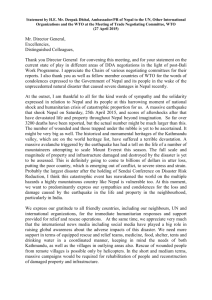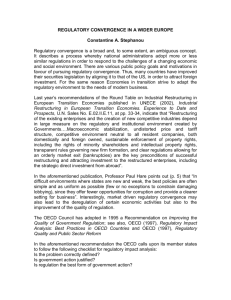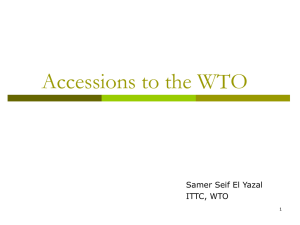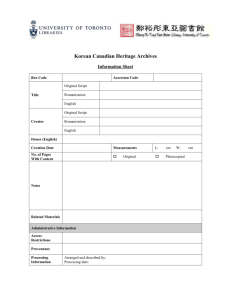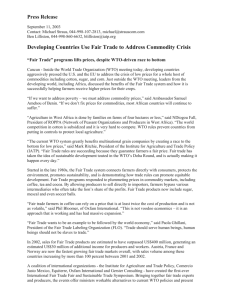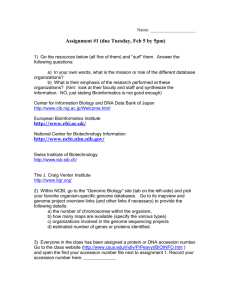LDCs' Accession to the WTO - UN-NGLS
advertisement
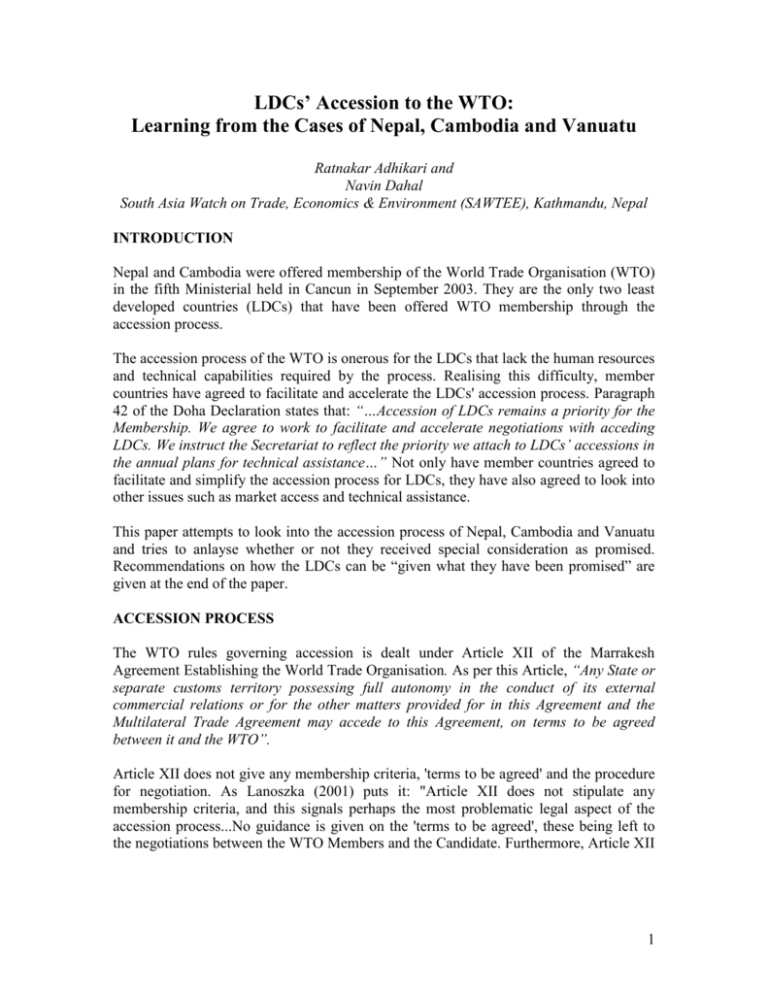
LDCs’ Accession to the WTO: Learning from the Cases of Nepal, Cambodia and Vanuatu Ratnakar Adhikari and Navin Dahal South Asia Watch on Trade, Economics & Environment (SAWTEE), Kathmandu, Nepal INTRODUCTION Nepal and Cambodia were offered membership of the World Trade Organisation (WTO) in the fifth Ministerial held in Cancun in September 2003. They are the only two least developed countries (LDCs) that have been offered WTO membership through the accession process. The accession process of the WTO is onerous for the LDCs that lack the human resources and technical capabilities required by the process. Realising this difficulty, member countries have agreed to facilitate and accelerate the LDCs' accession process. Paragraph 42 of the Doha Declaration states that: “…Accession of LDCs remains a priority for the Membership. We agree to work to facilitate and accelerate negotiations with acceding LDCs. We instruct the Secretariat to reflect the priority we attach to LDCs’ accessions in the annual plans for technical assistance…” Not only have member countries agreed to facilitate and simplify the accession process for LDCs, they have also agreed to look into other issues such as market access and technical assistance. This paper attempts to look into the accession process of Nepal, Cambodia and Vanuatu and tries to anlayse whether or not they received special consideration as promised. Recommendations on how the LDCs can be “given what they have been promised” are given at the end of the paper. ACCESSION PROCESS The WTO rules governing accession is dealt under Article XII of the Marrakesh Agreement Establishing the World Trade Organisation. As per this Article, “Any State or separate customs territory possessing full autonomy in the conduct of its external commercial relations or for the other matters provided for in this Agreement and the Multilateral Trade Agreement may accede to this Agreement, on terms to be agreed between it and the WTO”. Article XII does not give any membership criteria, 'terms to be agreed' and the procedure for negotiation. As Lanoszka (2001) puts it: "Article XII does not stipulate any membership criteria, and this signals perhaps the most problematic legal aspect of the accession process...No guidance is given on the 'terms to be agreed', these being left to the negotiations between the WTO Members and the Candidate. Furthermore, Article XII 1 does not identify any concrete steps, nor does it provide any advice when it comes to the procedures to be used for negotiating the terms of accession". 1 Since the WTO is an inter-governmental organisation, which does not have any power to negotiate accession agreement with the aspirants, it is the member countries that dictate the terms and conditions for such entry.2 The provision of the above-mentioned Article is being interpreted by the developed member countries as providing them Carte Blanche to impose unreasonable conditions (often known as “WTO plus” conditions) on the acceding countries. For all practical purpose, the accession process has become akin to obtaining the membership to a golf club where the existing members decide the terms and conditions. Those members who agree to comply with the requirements will be admitted to the club and those who cannot do so, will never be admitted at all!3 The WTO accession process can be divided into three phases. In the first stage, a country wishing to become a member of the WTO submits an application to the General Council of the WTO. The General Council establishes a Working Party of all interested WTO members. The applicant then submits to the Working Party a detailed memorandum on its foreign trade regime, describing, among other things, its economy, economic policies, domestic and international trade regulations, and intellectual property policies. In the next stage the Working Party members submit written questions to the applicant to clarify aspects of its foreign trade regime. After all necessary background information has been acquired; the Working Party begins meetings to focus on issues of discrepancy between the applicant’s international and domestic trade policies and laws and WTO rules and laws. The final stage of the accession process consists of series of bilateral negotiations between the applicant and WTO members. When the bilateral talks conclude, the Working Party sends an accession package, which includes a summary of all Working Party meetings and the Protocol of Accession to the General Council or the Ministerial Conference. Once the General Council or the Ministerial approves of the terms of accession, the applicant must accept the protocol of accession. Thirty days after the applicant accepts the protocol of accession it becomes an official member of the WTO. Nepal Nepal had formally applied for General Agreement on Tariffs and Trade (GATT) membership on May 1989. But Nepal’s accession under the GATT was suspended after the GATT was transformed into the WTO in 1995. Subsequently, its observer status to the GATT was transformed into the WTO in December 1995 and Working Party was also established on the same date. Nepal submitted its Memorandum of Foreign Trade Regime (MFTR) in 1998 describing, among other things, its economy, economic policies, domestic and international trade regulations, and intellectual property policies. The queries and complaints form Working Party members were compiled by the WTO Charveriat, Celine and Mary Kirkbride (2003), Cambodia’s Accession to the WTO: How the Law of the Jungle is Applied to One of the World’s Poorest Countries, Briefing Note, Oxfam International, Oxford. 2 Adhikari, Ratnakar (2002), “Birth Defects of WTO Accession” in The Kathmandu Post 27 March 2002. 3 Adhikari, Ratnakar (2003), “Acceding LDCs in Catch 22 Situation” in AP Consumers, Consumers International, Regional Office for Asia and the Pacific, Kuala Lumpur. 1 2 Secretariat and were forwarded to Nepal in January 1999. There were altogether 365 questions, 24 on economy, economic policies and foreign trade, 178 on the framework for making and enforcing policies affecting foreign trade in goods and services, 114 on trade-related intellectual property rights regime and 48 on trade-related service regime. Nepal responded to these queries in 1999 and 2000. The first meeting of the Working Party was held on 22 May 2000 at the WTO Secretariat in Geneva. After this meeting, the WTO forwarded additional questions that were raised during the Working Party meeting and submitted in writing by the member countries. In response to the development in the first Working Party meeting, Nepal submitted a schedule of tariff concessions and schedule of initial commitments on services sector in July 2000. In its accession process, Nepal held five rounds of bilateral negotiations and attended three Working Party meetings. The fifth Ministerial Conference in Cancun approved the terms of accession of Nepal and offered membership. The accession process is lengthy and taxing for an LDC like Nepal. The documentation required and bilateral negotiations are beyond the human, technical and institutional capabilities of these countries. Cambodia The Working Party on Cambodia’s accession was established on 21 December 1994 and the members of the Working Party included Australia, Canada, China, EU, India, Japan, Republic of Korea, Malaysia, New Zealand, Panama, Singapore, Chinese Taipei, Thailand, United States and Venezuela. During the accession process Cambodian delegates had to go to Washington, Brussels and Canberra to negotiate bilateral deals with US, EU and Australia. Vanuatu The accession bid of Vanuatu, an Island LDC with a population of merely 190,000, and its subsequent withdrawal from WTO membership represent a spine-chilling experience of WTO-plus conditions imposed by the developed member countries. Vanuatu applied for WTO membership in July 1995. The country had been a de facto member of the GATT; colonial countries automatically attained this status when they achieved independence from colonial powers that were GATT members. However, to become fullfledge members of the GATT, these countries were supposed to apply to formally accede to the organisation before their de facto status expired. The countries that went through this process on time automatically became the members of the WTO when it replaced the GATT. However, the government of Vanuatu was unable to decide whether it should go through this accession process before its de facto GATT membership expired. As such, 3 when it subsequently decided that it would in fact like to join the WTO, it had to apply for membership as an outsider.4 Initial target set by the trade negotiators of Vanuatu was to obtain membership during the third Ministerial Conference of the WTO held in Seattle in November-December 1999. However, the negotiations became so protracted due to the imposition of a number of WTO-plus conditions that it was politically difficult for Vanuatu to fulfill all of them. Therefore, the target of acceding to the WTO by the Seattle Ministerial was missed. After nearly six years of acrimonious negotiations, on 29 October 2001, the Working Party for the Accession of Vanuatu to the WTO formally accepted the country’s terms of accession, paving the way for its accession during the fourth Ministerial held in November 2001 at Doha. However, after a few days, the government of Vanuatu sent a letter to the WTO Secretariat requesting a “technical delay” in its accession procedure. 5 Though Vanuatu has not communicated officially the reason for the virtual withdrawal of its accession application to the WTO or its members, it is suspected that it was forced to do so because of the WTO-plus conditions imposed by the developed member countries as a part of its accession package. The process of accession is also made difficult by the fact that though members say that they will give special consideration to LDCs, in practice, they try to get maximum concession from the acceding member. This is done due to two reasons. First, the members want to set precedence of high concessions by acceding members and second, they themselves do not have to give any concession as the process is not reciprocal. The ambiguity of the accession process, the demands of the existing members and the procedural requirements of the WTO have made the accession process very difficult for LDCs. Thus, a major reason for the inability of LDCs to enter into the system is the protracted negotiation process leading to accession – which results in exhaustion of human, administrative and political capital of the LDCs. 6 This problem is faced by the developing countries as well as LDCs alike, however, the severity of the problem is more acute in the case of LDCs. This is also reflected by the fact that only two LDCs have been offered membership through the accession process in the nine years of the WTO. MARKET ACCESS AND DOMESTIC SUPPORT The decision of the General Council dated 10 December 2002 on Streamlining Accession of the LDCs states that “WTO Members shall exercise restraint in seeking concessions and commitments on trade in goods and services from acceding LDCs, taking into account the levels of concessions and commitments undertaken by existing WTO LDCs' Members.” and “Acceding LDCs shall offer access through reasonable concessions and Hayashi, Michiko (2003), “Arrested Development: Vanuatu’s Suspended Accession to the WTO” a Case Study Prepared for the International Commercial Diplomacy Project, Geneva. 5 Ibid 6 Adhikari, Ratnakar (2003), “Acceding LDCs Need Fair Treatment” in EU-LDC Brief, September, EULDC Network, Rotterdam. 4 4 commitments on trade in goods and services commensurate with their individual development, financial and trade needs, in line with Article XXXVI.8 of GATT 1994, Article 15 of the Agreement on Agriculture, and Articles IV and XIX of the General Agreement on Trade in Services.” However, in practice the acceding LDCs are asked to make concessions that are not only way beyond their capacities and stage of development but also beyond WTO requirements. Nepal Nepal faced major problem in the area of tariff binding, in particular of agricultural commodities. At present, Nepal’s applied tariffs are very low (0 to 10 percent) on agricultural products, but it has been proven beyond doubt that such a tariff structure has resulted in flooding of imports triggering displacement of farming communities. Therefore, Nepal wanted to create a policy space for protecting the agricultural sector, should the need arise, by binding tariffs on agricultural products at an average of 60 percent. However, the developed member countries, notably the United States of America (USA), opposed such a proposal. Nepal was forced to bind its average tariff at 42 on the agricultural sector. On the areas of services too Nepal was asked to undertake commitment on audio-visual, distribution, retail and wholesale services. Altogether Nepal has opened up 70 services sub-sectors, as compared to its neighour Bangladesh, which, by virtue of being a founder member of the WTO, has only opened up two services sub-sectors. Further, Nepal was asked to open all services sector in which Nepal has made commitment, for 100 percent equity participation by foreigners within a period of five years. However, since Nepal stood firm on its position, it could finally make the developed countries to get contend with only up to 80 percent foreign equity participation. Cambodia In the areas of services, Cambodia was asked to undertake commitment on audio-visual and distribution services – on which none of the incumbent LDCs have undertaken any commitment. Cambodia did succumb to the pressure of developed countries.7 During the accession process, Cambodia was under strong pressure from the developed countries to forgo the right to use export subsidies in industrial sectors, which are allowed for LDCs under the Agreement on Subsidies and Countervailing Measures. Cambodia finally managed to retain this right.8 However, Cambodia was unable to retain the right to introduce export subsidies on agriculture. Just because Cambodia does not maintain any export subsidy on agriculture, its possibility of introducing the same in the future to 7 Adhikari, Ratnakar (2003), EU LDC WTO (2003a), Report of the Working Party on the Accession of Cambodia, WT/ACC/KHM/21, World Trade Organisation, Geneva 8 5 protect its extremely vulnerable farming sector was reduced to zero by the commitment it was forced to make during its accession process.9 Vanuatu On the issue of tariff bindings, Vanuatu proposed to maintain a simple average tariff of 49 percent10, but the US argued that the simple average rate of 49 percent was still too high and demanded that it be reduced to the rate of 25 percent. 11 Vanuatu also agreed to provide duty free access for more than 160 tariff lines in aircraft, aircraft parts, and pharmaceutical products by 2005 under the Zero-to-Zero Tariff Reduction Initiatives and the Information Technology Agreement. No LDC and only a limited number of developing countries that were already WTO members had participated in these tariff agreements.12 Similarly, Vanuatu had to replace tariff escalation on “sin goods” (alcohol, tobacco and weapons) with excise taxes and to bind all alcohol tariffs at the applied rates.13 In the area of services, Vanuatu was asked to make offer in 18 areas14, which is more than four times the average for existing LDC members of the WTO. The only two major exceptions in which Vanuatu was not willing to commit itself were telecommunication and distribution services, due to domestic political compulsions. However, towards the end of the negotiations it had to give in to the pressure of the USA and agreed to open up retail and wholesale services for foreign investment.15 Agriculture was yet another contentious issue during the accession process of Vanuatu. Vanuatu had long imposed seasonal quantitative restrictions on potatoes to develop the Irish potato production capacity in the island of Tanna, situated in the northwest of Vanuatu. The potato production programme was considered a key rural agricultural development project. However, under the WTO's Agreement on Agriculture (AoA), current and potential members are obliged to convert any non-tariff measures to tariffs. But in doing so, Vanuatu wanted to retain the right to protect potato production in accordance with the AoA’s Article 5 provision on special safeguard (SSG) measures. However, Vanuatu had to finally agree not to impose SSG on potatoes because of the intense pressures from Australia and New Zealand, two of its neighbouring countries from which it was hopeful of getting some support during the process of its accession.16 Another contested measure concerned copra. Vanuatu occasionally had used a price support programme for this commodity. The government of Vanuatu wanted to retain its 9 Charveriat, Celine and Mary Kirkbride (2003), above note 1. UNCTAD (2003) WTO Commitments by Cambodia, Nepal and Vanuatu –Comparative Table, 18 September 2003/VO/MH/DITC, UNCTAD, Geneva:26 . 11 Hayashi, Michiko (2003), above note 4. 12 UNCTAD (2003) above note 10. 13 Ibid 14 Hayashi, Michiko (2003), above note 4. 15 The only conditions imposed were placed on the offer involved national treatment: non-citizens and nonresident investors would have to obtain a license and pay an additional annual fee. See Ibid 16 Hayashi, Michiko (2003), above note 4. 10 6 right to use the price support programme for copra under Article 15 of the AoA, which exempts LDC members from any reduction commitments. However, Australia and New Zealand refused to grant Vanuatu the right to use SSG measures or keep the price support programme with the threat to discontinue bilateral aids provided to it for reducing latter’s dependence on copra. Accordingly, Vanuatu decided to give in to the demands from Australia and New Zealand.17 SPECIAL AND DIFFERENTIAL TREATMENT The decision of the General Council dated 10 December 2002 on Streamlining Accession of the LDCs states that, “Special and Differential Treatment, as set out in the Multilateral Trade Agreements, Ministerial Decisions, and other relevant WTO legal instruments, shall be applicable to all acceding LDCs, from the date of entry into force of their respective Protocols of Accession;” However, when we look at the cases of Nepal, Vanuatu and Cambodia, we see that this has not been the case in practice. Nepal According to the Trade Related Intellectual Property Rights (TRIPS) Agreement, LDCs are provided transition period up to 1 January 2007 for the implementation of the Agreement. However, Nepal was asked to implement the non-discrimination provisions (most favoured nations and national treatment) contained in the TRIPS Agreement right from the date of accession. Moreover, the developed countries did not make any reference to Declaration on TRIPS and Public Health adopted by the trade ministers at Doha in November 2001 in the Working Party Report. Cambodia Cambodia was asked to introduce data protection immediately after its accession to the WTO, which is ahead of both the 2007 accession requirement to comply with TRIPS, and the new compliance period for pharmaceutical patenting agreed at Doha for LDCs i.e. 2016. This requirement goes beyond what is required by TRIPS. Vanuatu Vanuatu, being an LDC, is also not required to comply with the requirements of the TRIPS Agreement before 2006 as per the Article 66.1 of the Agreement. However, the USA demanded that it made a commitment to have TRIPS compliant legislation in place “from the date of its accession.” Eventually, it was accepted by Vanuatu that it would “apply the TRIPS Agreement no later than two years after the date of its accession”.18 OTHER ISSUES 17 Ibid UNCTAD (2003), WTO Commitments by Cambodia, Neal and Vanuatu – Comparative Table, 18 September 2003/VO/MH/DITC, UNCTAD, Geneva: 26 18 7 Nepal, Cambodia and Vanuatu were also forced to agree to other WTO-plus conditions during their accession process. Nepal One of the most controversial issues that came up during Nepal’s accession process was that it was asked to join the International Union for the Protection of New Varieties of Plants (UPOV). However, due to pressures from the Nepalese non-governmental organisations (NGOs), mainly SAWTEE and ActionAid Nepal, the USA finally had to agree to a minimalist text. As per the text of the approved Accession Treaty, Nepal will have to only explore the possibility of joining various World Intellectual Property Organisations (WIPO) conventions including UPOV at a future date, taking into account its national interests.19 Nepal was asked to bind other duties and charges (ODCs) at zero and make a commitment to phase them out over a two to 10 year period. Since Nepal currently imposes ODCs under five different headings, phasing them out will have a devastating effect on the Nepalese economy.20 Nepal tried to argue, during its accession process, that the GATT Article II:1(b) only requires member countries to bind them at the exiting level and does not mention anything about reducing them. However, it turned out that all the countries which have acceded to the WTO prior to Nepal had made commitment to bind them at zero thus setting a highly unfavourable precedence from Nepal’s standpoint. Ultimately, Nepal had to give in. Cambodia On the issue of maintaining ODCs, Cambodia was put under tremendous pressure. This is despite the fact that Article II:1 (b) of the GATT allows member countries to maintain ODCs provided they agree to bind them at the prevailing level. However, in practice all the acceding countries have been forced to bind ODCs at zero. Cambodia was hoping that it would be provided with a transition period to phase them out rather than being asked to outright eliminate them. However, such a hope was shattered, with Cambodia asked to bind ODCs at zero from the date of accession.21 Paragraph 122 of the Working Party report states"...Nepal would also look at other WIPO and IP related Conventions, e.g., Geneva Phonograms Convention, UPOV 91, WIPO Copyright Treaty and WIPO Performances and Phonograms Treaty, in terms of national interest and explore the possibility of joining them in the future, as appropriate." (emphasis added). See Adhikari, Ratnakar and Kamalesh Adhikari (2003), UPOV: Wrong Agreement and Coercive Practices, Policy Brief 5, SAWTEE, Kathmandu for a detailed account of how Nepal fended off attack on its sovereignty. 20 They include: a) Agriculture Development Fees (ADF) 20; b) LDF; c) Special Duty (SD); d) Cigarette and Alcohol Fee (CAF); and e) Cigarette and Alcohol Control Fee (CACF). See Adhikari, Ratnakar (2003), Impact of Withdrawing Local Development Fees on Decentralisation Process in Nepal, Report submitted to United Nations Development Programme (UNDP) – Asia Trade Initiatives, Hanoi. 19 21 WTO (2003a), Report of the Working Party on the Accession of Cambodia, WT/ACC/KHM/21, World Trade Organisation, Geneva 8 Another important WTO-plus condition imposed on Cambodia is that it would have to obtain the membership of UPOV. It is also required to enact a legislation for the protection of plant variety as per the model prescribed by the UPOV as a part of its obligation under the Article 27.3 (b) of TRIPS Agreement, which requires member countries to provide protection to plant varieties either through patent, or an effective sui generis system or any combination thereof.22 Developed countries argue that the UPOV model is the only effective sui generis system and are trying to impose this model on each acceding country, despite the fact that TRIPS does not mention anything about UPOV.23 Cambodia could not even take shelter under LDC umbrella and had to finally give in.24 The Cambodian negotiators request for technical assistance for the implementation of four agreements, TRIPS, custom valuation, TBT and SPS were rejected out rightly by the US. Recognising the financial burden of implementing these agreements Cambodian negotiators had tried to get binding commitments from WTO member countries for technical assistance related to implementation of these four agreements and beyond. Cambodia had to finally drop this request when the WTO secretariat suggested that the US was against establishing such linkage.25 Vanuatu During the ill-fated accession process, Vanuatu was asked by the USA to join the Agreement on Government Procurement, a plurilateral agreement (as opposed to multilateral agreement which does not need to be signed by all the WTO members) despite the fact that it is not required to sign on to this agreement as per the existing provisions of the WTO.26 RHETROIC GALORE The examples provided above reinforce the notion that the developed member countries of the WTO are hell-bent on imposing WTO-plus conditions on LDCs. One can conclude, therefore, that WTO accession process is inherently power based and the very antithesis of the WTO’s credo.27 Indeed, the acceding countries do not receive what they deserve but what they negotiate.28 Adhikari, Ratnakar (2003), “Hydra-headed UPOV”, in The Kathmandu Post, 15 August. See generally Kanniah, Rajeswari (2003), TRIPS, Farmers' Rights and Food Security: The Issues at Stake, Consumers International, Asia Pacific Office, Kuala Lumpur. 24 Adhikari, Ratnakar (2003), EU-LDC 25 Charveriat, Celine and Mary Kirkbride (2003), Cambodia’s Accession to the WTO: How the Law of the Jungle is Applied to One of the World’s Poorest Countries, Briefing Note, Oxfam International, Oxford 26 See Grynberg, Roman and Roy Mickey Joy (2000), “The Accession of Vanuatu to the WTO: Lessons for the Multilateral Trading System” in Journal of World Trade, 34(6) 27 Grynberg, Roman and Roy Mickey Joy (2000), above, note 6. 28 Bhattacharya, Debapriya and Mustafizur Rahman (1999), “The Least Developed Countries in The WTO: Strengthening Participation Capacities”, paper presented at the Meeting of Senior Officials on Future WTO Trade Agenda and Developing Countries, organised by U.N.-ESCAP, Bangkok, 23-25 August, 3 (1999). 22 23 9 The most depressing aspect, however, is that it is very difficult to change the WTO accession process. The main reason for this is that the acceding countries have no role to play while setting the rules relating to accession since they are by definition outside the system.29 Such an appalling scenario, as it exits today, only serves to undermine the credibility of the WTO as a rules-based system. Other LDCs, which are in the process of accession, too are facing similar problems despite the fact that paragraph 9 of the Doha Ministerial Declaration, signed by 142 member countries of the WTO at Doha, Qatar in November 2001 commits themselves “to accelerating the accession of LDCs.” Moreover, in paragraph 42 of the Declaration, they agreed “to work to facilitate and accelerate negotiations with acceding LDCs.” 30 Furthermore, General Council too had decided on 10 December 2002 to streamline the process of LDCs’ accession.31 Despite resounding rhetoric, LDCs’ accession process continues to be highly protracted, politically demanding and frustrating. Acceding LDCs had pinned hope on the LDC Ministers’ Conference concluded in Dhaka in June 2003 to come out with some path breaking recommendations, which could then be pushed as a part of common position of the LDCs during the Cancun Ministerial. However, their hope was shattered again because of the mention of only the following words in paragraph 15:X of the Declaration: “Expeditious and full implementation of the guidelines for accession of LDCs adopted by the General Council.”32 These wordings represent a much lighter tone because they do not drive home the real message that acceding LDCs should not be required to undertake higher level of commitments than their member counterparts have made at the WTO. The Ministers have failed to recognise the fallacy of the above-mentioned guidelines, especially their nonbiding character. The Cancun Ministerial Text33 also failed to address this issue. The three drafts issued on 1 July, 24 August and 13 September contain the following language: “We continue to attach great importance to concluding accession proceedings as quickly as possible and, in particular, to accelerating the accession of least-developed countries. In this regard, we reaffirm the guidelines to facilitate the accession of LDCs adopted by the General Council on 10 December 2002.”34,35,36 However, there is hardly anyone in the trade circle, who feels that the above-mentioned decision was helpful even to the slightest possible extent in facilitating the fast track accession of the LDCs to the WTO. 29 Grynberg, Roman and Roy Mickey Joy (2000), above, note 6. See WTO (2001) Doha Ministerial Declaration, WT/MIN(01)/DEC/1, 20 November, Geneva 31 See WTO (2003b) Accession of the Least Developed Countries, Decision of 10 December 2002, WT/L/508 (03-0191), 20 January, Geneva. 32 Ministry of Commerce, Bangladesh (2003), Dhaka Declaration, LDC-II/2003/L.1/REV.1, 2 June, Dhaka. 33 The Ministerial Text could not be materialised later because of the failure of the Cancun Ministerial. 34 WTO (2003c), Draft Cancun Ministerial Text, JOB(03)/150, 18 July 2003, Geneva. 35 WTO (2003d), Draft Cancun Ministerial Text, JOB(03)/150/REV.1, 24 August, Geneva. 36 WTO (2003e), Draft Cancun Ministerial Text, Second Revision, JOB(03)/150/REV.2, 13 September, Cancun. 30 10 THE WAY FORWARD If the developed country members of the WTO really want to accelerate and simplify the accession process of the LDCs they need to move beyond rhetoric. This will happen only when the following recommendations are seriously pursued at various international fora including, but not limited to, the WTO: Article XII of the WTO should be interpreted with clear-cut guidelines detailing transparent criteria for accession of a country or a separate custom territory. The WTO should incorporate a specific provision for the accession of LDCs, where the LDCs, seeking accession, will not require bilateral negotiation on market access. Acceding LDCs should be asked to make commitments commensurate with their level of economic development, capacity and their trade and financial needs. Acceding LDCs should not be required to undertake higher level of commitments than those made by the founding LDC member countries of the WTO. Moreover, acceding LDCs should not be asked to make commitment on any of the plurilateral agreements of the WTO or to participate in other optional sectoral market access initiatives. Special and differential treatments including but not limited to transitional periods/ transitional arrangements, as set out in the Multilateral Trade Agreements, Ministerial Decisions, and other relevant WTO legal instruments, should be applicable to all acceding LDCs, from the date of entry into force of their respective Protocols of Accession. Special and differential treatments must be made mandatory and legally binding and subject to dispute settlement system of the WTO (including notification requirements and inclusion of these commitments in the country schedules). Developed member countries of the WTO should provide technical assistance to the acceding LDCs to implement the commitments they have been asked to make by the existing member countries at the time of the formers’ accession to the WTO. Given the importance of the agricultural sector in the economies of LDCs, particularly its role in human development, food security and rural development, LDCs should not be required to make commitments on subsidies and tariffs. LDCs should also have access to simplified safeguard mechanism. 11 REFERENCE Adhikari, Ratnakar (2002), “Birth Defects of WTO Accession” in The Kathmandu Post, 27 March 2002, Kathamndu. Adhikari, Ratnakar (2003), “Acceding LDCs in Catch 22 Situation” in AP Consumers, Consumers International, Regional Office for Asia and the Pacific, Kuala Lumpur. Adhikari, Ratnakar (2003), “Acceding LDCs Need Fair Treatment” in EU-LDC Brief, September, EU-LDC Network, Rotterdam. Adhikari, Ratnakar (2003), “Hydra-headed UPOV”, in The Kathmandu Post, 15 August. Adhikari, Ratnakar (2003), Impact of Withdrawing Local Development Fees on Decentralisation Process in Nepal, Report submitted to United Nations Development Programme (UNDP) – Asia Trade Initiatives, Hanoi. Adhikari, Ratnakar and Kamalesh Adhikari (2003), UPOV: Wrong Agreement and Coercive Practices, Policy Brief 5, SAWTEE, Kathmandu. Bhattacharya, Debapriya and Mustafizur Rahman (1999), “The Least Developed Countries in The WTO: Strengthening Participation Capacities”, paper presented at the Meeting of Senior Officials on Future WTO Trade Agenda and Developing Countries, organised by U.N.-ESCAP, Bangkok, 23-25 August, 3 (1999). Charveriat, Celine and Mary Kirkbride (2003) Cambodia’s Accession to the WTO: How the Law of the Jungle is Applied to One of the World’s Poorest Countries, Briefing Note, Oxfam International, Oxford. Grynberg, Roman and Roy Mickey Joy (2000), “The Accession of Vanuatu to the WTO: Lessons for the Multilateral Trading System” in Journal of World Trade, 34 (6). Hayashi, Michiko (2003), “Arrested Development: Vanuatu’s Suspended Accession to the WTO” a Case Study Prepared for the International Commercial Diplomacy Project, Geneva. Kanniah, Rajeswari (2003), TRIPS, Farmers' Rights and Food Security: The Issues at Stake, Consumers International, Asia Pacific Office, Kuala Lumpur. Ministry of Commerce, Bangladesh (2003), Dhaka Declaration, LDC-II/2003/L.1/REV.1, 2 June, Dhaka. Nepal Rastra Bank, Research Department (2002), WTO and Nepal UNCTAD (2003), WTO Commitments by Cambodia, Neal and Vanuatu – Comparative Table, 18 September 2003/VO/MH/DITC, UNCTAD, Geneva: 26 WTO (2001) Doha Ministerial Declaration, WT/MIN(01)/DEC/1, 20 November, Geneva WTO (2003a), Report of the Working Party on the Accession of Cambodia, WT/ACC/KHM/21, World Trade Organisation, Geneva WTO (2003b) Accession of the Least Developed Countries, Decision of 10 December 2002, WT/L/508 (03-0191), 20 January, Geneva. WTO (2003c), Draft Cancun Ministerial Text, JOB(03)/150, 18 July 2003, Geneva. WTO (2003d), Draft Cancun Ministerial Text, JOB(03)/150/REV.1, 24 August, Geneva. WTO (2003e), Draft Cancun Ministerial Text, Second Revision, JOB(03)/150/REV.2, 13 September, Cancun 12
